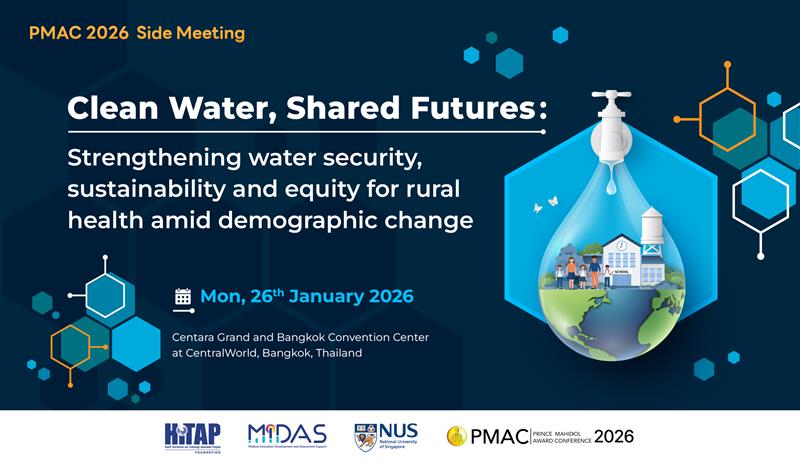Side Meetings
SMB110
Clean Water, Shared Futures: Strengthening water security, sustainability and equity for rural health amid demographic change
26
Jan
- Health Intervention and Technology Assessment Program Foundation

Rural schools and district healthcare facilities in rural areas are central to shaping the country’s demographic future as they nurture the next generation and safeguard community health, particularly among children and older populations. However, a persistent lack of access to safe water hinders their equitable health and development outcomes. Ensuring clean water access remains one of the most urgent yet solvable challenges in low- and middle-income countries. In Thailand, Lao PDR and Cambodia, seasonal floods, geographical isolation and limited infrastructure force many schools and district hospitals in rural areas to rely on contaminated water sources, giving rise to waterborne illnesses that disrupt education, reduce productivity, and strain already limited health resources. These preventable challenges not only create high health and financial burden but also amplify broader socioeconomic inequities.
Addressing this challenge requires both short- and long-term solutions. Innovative, scalable and cost-effective filtration solutions alongside community engagement can provide safe water while strengthening health equity, resilience, and sustainable development. Working in collaboration with regional health authorities, Thai Public Broadcasting Service (Thai PBS), National University of Singapore (NUS) and a social enterprise Wateroam, we initiated a project to install and evaluate water filtration systems in rural schools and hospitals in Northern Thailand. Separately, NUS and Wateroam have also initiated similar projects in Lao PDR and Cambodia. Beyond infrastructure, the project emphasizes stakeholder engagement, training, and rigorous assessment of health and economic outcomes, ensuring that interventions are not only impactful but also financially and institutionally sustainable in the long run.
This side meeting aims to provide a platform for discussing water security in low- and middle-income countries from various perspectives. As populations grow and schools and district healthcare facilities expand to serve more people, the need for safe and reliable water becomes more urgent. This session will explore the intersections of water access, health equity and infrastructure development to identify challenges and opportunities to ensure safe, reliable water for all. By examining innovative solutions and community-driven approaches, the discussion will highlight strategies to enhance health outcomes and resilience in rural communities. The focus of this meeting is aligned with Sub-theme 1 of PMAC 2026, which looks at “Demographic Transitions, Social Equity, and Population Diversity”.
The objectives of this side meeting are to:
1. Explore insights on challenges and opportunities for securing clean water in rural schools and healthcare facilities in northern Thailand, Lao PDR and Cambodia
2. Examine the feasibility and innovative approaches to impact evaluation and return-on-investment (ROI) assessment for clean water solutions
3. Identify sustainable financing mechanisms and business models, with insights from governments, development partners, and the private sector, to ensure long-term access to clean water
4. Foster a network of experts, stakeholders, interested party to initiate collaboration and lay groundwork to drive forward development of infrastructure to ensure clean water access in the region

